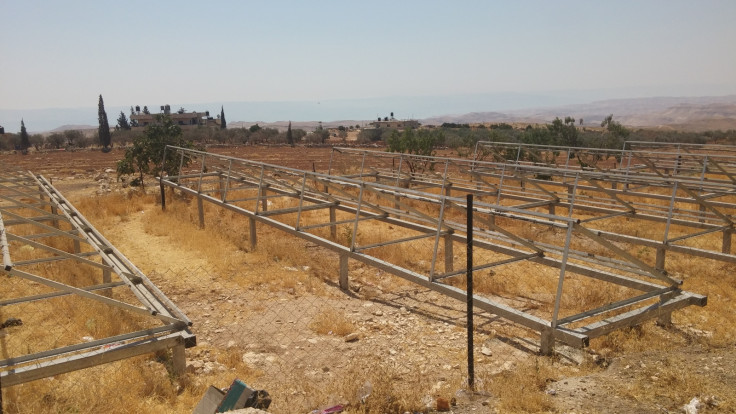The Netherlands wants Israel to return Dutch solar panels seized from Palestinians
Israeli authorities confiscated 96 solar panels from Jubbet Adh-Dhib for lacking "proper permits".

The Netherlands has filed a complaint with the Israeli government after it confiscated Dutch solar panels donated to Jubbet al-Dhib, a village in the Palestinian territories occupied by Israel.
The equipment was given as part of a Dutch-funded €500,000 ($567,612; £439,175) project to electrify areas of the West Bank. Of this, €350,000 funded the electrification of Jubbet Adh-Dhib.
However, on 28 June the Israeli Civil Administration (ICA), the body governing Area C in the West Bank, confiscated 96 panels and electronic equipment – worth €40,000 – from Jubbet Adh-Dhib's electric system, arguing that they had been built without proper permits, local media reported.
The Netherlands' foreign ministry demanded Israel return the seized equipment to the village and it is "currently assessing what next steps can be taken," Israeli news site Haaretz reported.
An unnamed source close to Dutch diplomats in the West Bank told the news site there was anger brewing in the Netherlands government following the seizure.
The electric system in Jubbet Adh-Dhib was built in 2016 by Israeli-Palestinian NGO Comet-ME, which provides sustainable energy and clean water to disenfranchised communities. The organisation said in a statement on its website that the equipment was seized "without prior warning and without having issued stop-work orders beforehand".
The organisation continued: "ICA workers also caused considerable damage, both to the solar panels and to the electricity room – breaking some of the panels, cutting many electricity and communication cables, and ripping the components off the walls of the electricity room – with the clear intention of preventing the future use of the system."
Michael Sfard, Comet-ME's legal adviser, told IBTimes UK the confiscation constituted "a violation of international law".
"International Humanitarian law and especially international laws of occupation, impose a duty on the occupying power – Israel – to supply the occupied communities with their humanitarian needs," he said.
"Electricity is considered today by all legal experts a humanitarian need. It allows refrigeration of food and medicine, it provides light and energy for medical treatment and it allows the maintenance of social life. The installment of a renewable energy system in the village is an act of provision of humanitarian relief. As such, Israel has a legal obligation to allow it and assist its carrying out.
"By raiding the village, seizing the solar panel and damaging the system, Israel has further breached another principle of international law: the prohibition on damaging humanitarian objects. This is a grave violation and has no possible justification," Sfard concluded.
The Israeli embassy in London has not responded to a request for comment.
A spokesperson for the Coordination of Government Activities in the Territories (COGAT) said in a statement sent to IBTimes UK: "On 28th June 2017, illegal solar and electric panels were detected in Jubb al-Thib, which were established without the necessary permits. Also, constriction freeze warrants were given to and illegal electricity room at the village and to the panels stands. We emphasize that the village has other electricity sources."
However, Comet-ME rejected the claims.
"The solar micro-grid that has powered the community since November 2016 was the first time in its history that the community had a reliable and consistent – not to mention clean and safe – source of electricity," a spokesperson for the organisation told IBTimes UK.
Citing a 2010 report by Human Rights Watch, the spokesperson said residents in Jubbet adh-Dhib have applied for a "connection to the Israeli electricity" numerous times since 1988, but all requests have been refused.
© Copyright IBTimes 2024. All rights reserved.







